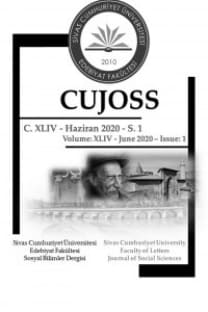Kapitalizm ve Hegemonya İlişkileri Bağlamında Boş Zaman
Kapitalizm ile boş zaman arasındaki ilişki görünenin ötesinde karmaşık bir nitelik taşır. Kapitalizm bir yandan çalışmayı yeniden üretmek için diğer yandan tüketim sığasını artırabilmek için boş vakti maksatlı bir kullanıma açar. Çalışma üzerinde kurduğu denetimi, boş zaman alanlarına yaymaya çalışır, değişik manipülatif araçlar yoluyla, boş zamanı kendi egemenliğini pekiştirecek bir alan olarak kurar. Bunun için etkili bir ideolojik hegemonya tesis eder. Bunu, reklam, propaganda, moda, imaj, gösterge vs. ile kitleye benimsetmeye çalışır. Bu çalışmada, kapitalizm özelinde boş zamanın aldığı yeni pozisyona, kapitalizmin bir av sahası haline gelişine, ideolojik hegemonya vasıtasıyla boş zamanın sömürgeleştirilişine dikkat çekilmektedir.
Leisure in the Context of Capitalism and Relations of Hegemony
The relation between capitalism and leisure has a complex property beyond the sight. Capitalism opens leisure to an intentional use on the one hand to reproduce the work and on the other hand to be able to increase consumption capacity. It tries to spread the control which it establishes upon work to the fields of leisure time. Capitalist system sets up leisure as an area in which it would strengthen its own domination through its different manipulative instruments. Therefore it establishes an influential ideological hegemony.It tries to adopt this upon the mass by means of advertisement, propaganda, fashion, image, sign, etc. In this study, the new position that leisure get in the speciality of capitalism, converting capitalism to a hunt area, colonization of leisure time via ideological hegemonya are called attention.
___
- ARGIN, Şükrü. (2003), Nostalji ile Ütopya Arasında, İstanbul: Birikim Yay.
- ARGIN, Şükrü. (l992), “Kapitalist Toplumda İşin ve İşgücünün Kaderi: Fordizmden Post-Fordizme”, Birikim, Sayı 41, Eylül, s.16-28
- AYDOĞAN, Filiz. (2000), Medya ve Serbest Zaman, İst: Om Yayınları
- BAMBERY, Chris. (2002),"Marxizm ve Spor" Çev. C.Özerengin, Birikim, Sayı l58 Haziran, s. 82-93
- BAUDRILLARD, Jean. (1991), Sessiz Yığınların Gölgesinde Ya Da Toplumsalın Sonu, Çev. O.Adanır, İst: Ayrıntı Yayınları
- BAUDRİLLARD, Jean. (1997), Tüketim Toplumu, Çev.H.Deliçaylı-F.Keskin, İst: Ayrıntı Yay.
- BAUDRİLLARD, Jean. (2003), Simülakrlar ve Simülasyon, Çev. O.Adanır, İst: DoğuBatı Yay.
- BECKER, Samuel. (l984), “Marxist Approaches: The British Experience”, Critical Studies in Mass Communication, l/84, p. 66-80
- BENINGTON, John, Judy White. (1992), “Leisure Services at a Crossroads”, The Future of Leisure Services (der.J.Benington-J.White) London: Longman, p.1-36
- BERGER, Arthur Asa. (1991), “Bir Terör Aygıtı Olarak Televizyon: Kuramsal Bir Yaklaşım Denemesi”, Enformasyon Devrimi Efsanesi, Çev. Y.Kaplan, Kayseri: Rey Yayınları, s.33-57
- BOCOCK, Robert. (l997), Tüketim, Çev. İrem Kutluk, Ankara: Dost Yayınları
- BRAVERMAN, H. (1974), Labour and Monopoly Capitalism, Montly Review Press.
- BROHM, J.M. (1989), Sport: A Prison of Measured Time, Pluto Press.
- CORRIGAN, Paul. (l995), “What do Kids get out of Pop Music and Football?”, Sociology of Leisure A Reader (der. C.Critcher), London: E&FN Spon, p. 71-77
- CREEKMORE, Charlie. (1994), “Theory of the Leisure Trap” Utne Reader, Jan-Feb. n 61, p.61
- ÇABUKLU, Yaşar. (2004), Postmodern Toplumda Kriz ve Siyaset, İst: Kanat Yay.
- DANN, Graham. (2000), “Theoretical Advances in the Sociological Treatment of Tourism”, The International Handbook of Sociology (Ed. S. R.Quah and A. Sales), London: Sage, p.367-384
- GİTLİN, Todd. (l980), The Whole World is Watching, Berkeley: University of California Press
- GORZ, Andre. (l986), Elveda Proleterya,Çev. H.Tufan, İst: Afa Yay.
- GORZ, Andre. (l995), İktisadi Aklın Eleştirisi, Çev.I.Ergüden, İst: Ayrıntı Yay.
- GRAMSCİ, Antonio. (l971), Selections from the Prison Notebook, (der.Q. Hoare ve G.N.Smith) New York: International Publishers
- HALL, Stuart. (l982), “The Rediscovery of Ideology: Return to the Repressed in Media Studies” (der. M. Gurevitch vd.), Culture, Society and the Media, London: Routledge, p.56-90
- HALLIN, Daniel. (l986), The Uncensored War: The Media and Vietnam, Berkeley: University of California Press
- HEMİNGWAY, J.L. (1996). “Emancipating Leisure: The Recovery the Freedom in Leisure” Journal of Leisure Research, 28 (1), p. 27-43
- HIBBINS, Ray. (1996), “Global Leisure” Social Alternatives, Jan, Vol l5, issue l, p. 22-25
- HORKHEİMER, Max, Theodor W. Adorno. (l996), Aydınlanmanın Diyalektiği II, Çev.O.Özgül, İst: Kabalcı Yay.
- JUNIU, Susana. (2000), “Downshifting: Regaining the Essence of Leisure” Journal of Leisure Research, Win, v 32 i 1, p.69-73
- KELLY, John R., Valeria. J. Freysinger. (2000), 21st Century Leisure: Current Issues, Boston: Allyn and Bacon
- KUMAR, Krishan. (l999), Sanayi Sonrası Toplumdan Postmodern Topluma Çağdaş Dünyanın Yeni Kuramları, Çev. M.Küçük, Ank: Dost Kitabevi Yayınları
- LACLAU, Ernesto - Chantal Mouffe. (1992), Hegemonya ve Sosyalist Strateji, (Çev. A.Kardam/D.Şahiner), İst: Birikim Yayınları
- LULL, James. (2001), Medya, İletişim, Kültür, Çev. Nazife Güngör, Ank: Vadi Yayınları
- MANNELL, R. – D. Kleiber. (l997), A Social Psychology of Leisure, State College, PA: Venture Publishing
- MARSHALL, Gordon. (l999), Sosyoloji Sözlüğü, Ank: Ayraç Yayınları
- MOSCO, Vincent, Andrew Herman. (l983), “Radikal Toplum Kuramı ve İletişim Devrimi”, Kitle İletişiminde Temel Yaklaşımlar, (Der.K.Alemdar, R.Kaya) Ank: Savaş Yay. s. 103-138
- OKTAY, Ahmet. (l995), Medya ve Hedonizm İstanbul: Yön Yayınları
- OLSZEWESKA, Anna. (l989), “Poland: The Impact of the Crisis on Leisure Patterns”, Leisure and Life-Style. A Comparative Analysis of Free Time, (der. A.Olszewska and K.Roberts). London: Sage, p.17-38
- OSKAY, Ünsal. (l982), Çağdaş Fantazya, Ankara : AYKO Yayınları
- POSTMAN, Neil. (l994), Öldüren Eğlence, Gösteri Çağında Kamusal Söylem, Çev. O.Akınhay, İst: Ayrıntı Yayınları
- PRONOVOST, Gilles. (2000) “The Collapse of the Leisure Society? New Challenges for the Sociology of Leisure”, The International Handbook of Sociology (der. Stella R.Quah and Arnaud Sales), London: Sage Publications, p.356-366
- PRONOVOST, Gilles. (l998), “Leisure Workers”, Current Sociology, Vol. 48 (3), p. 56-63
- ISSN: 1305-5143
- Yayın Aralığı: Yılda 2 Sayı
- Yayıncı: Sivas Cumhuriyet Üniversitesi Edebiyat Fakültesi
Sayıdaki Diğer Makaleler
Sağlık Sektöründe Verimlilik ve Kalite Sistemi: Cumhuriyet Üniversitesi Hastanesi Örneği
HÜDAVERDİ Bircan, Serap BAYCAN
Görsel İletişim Aracı Olan Pul’un Tarihi Gelişimi Ve Grafik Ürün Olarak Önemi
The Field of Artificial Intelligence
Ebubekir Paşa ve Kıbrıs’taki İmar Faaliyetleri
Coğrafya Öğretimi ve Yaratıcı Düşünce
Kapitalizm ve Hegemonya İlişkileri Bağlamında Boş Zaman
Tarihsel Perspektifle Dönüşüm Öncesi Dönemde Doğu Avrupadaki Ekonomik Gelişmeler
